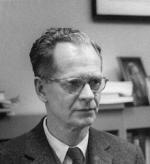Disable ads!
B. F. Skinner
B. F. Skinner B.F. Skinner at the Harvard Psychology Department, c. 1950 Born (1904-03-20)20 March 1904 Susquehanna, Pennsylvania Died 18 August 1990(1990-08-18) (aged 86) Cambridge, Massachusetts Nationality American Fields Psychology, linguistics, philosophy Institutions University of Minnesota Indiana University Harvard University Alma mater Hamilton College Harvard University Known for Operant conditioning Influences Charles Darwin Ivan Pavlov Ernst Mach Jacques Loeb Edward Thorndike William James Jean-Jacques Rousseau Henry David Thoreau Notable awards National Medal of Science (1968) Signature Burrhus Frederic (B. F.) Skinner (March 20, 1904 – August 18, 1990) was an American psychologist, behaviorist, author, inventor, and social philosopher. He was the Edgar Pierce Professor of Psychology at Harvard University from 1958 until his retirement in 1974. Skinner believed that human free will is an illusion and that any human action is the result of the consequences of the same action. If the consequences are bad, there is a high chance that the action will not be repeated; however if the consequences are good, the actions that led to it will become more probable. Skinner called this the principle of reinforcement. The use of reinforcement to strengthen behavior he called operant conditioning. As his main tool for studying operant conditioning Skinner invented the operant conditioning chamber, also known as the Skinner Box. Skinner developed his own philosophy of science called radical behaviorism, and founded a school of experimental research psychology—the experimental analysis of behavior. His analysis of human behavior culminated in his work Verbal Behavior, as well as his philosophical manifesto Walden Two, both of which[citation needed] still stimulate considerable experimental research and clinical application. Contemporary academia considers Skinner a pioneer of modern behaviorism along with John B. Watson and Ivan Pavlov. Skinner emphasized rate of response as a dependent variable in psychological research. He invented the cumulative recorder to measure response rate as part of his highly influential work on schedules of reinforcement. In a June 2002 survey, Skinner was listed as the most influential psychologist of the 20th century. He was a prolific author who published 21 books and 180 articles.
 Read more on wikipedia.org Read more on wikipedia.org
 All quotes by B. F. Skinner All quotes by B. F. Skinner
 Edit Edit
|

|
|
|
|
|
Background photo by Giuliana
|